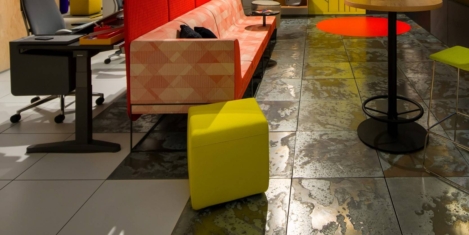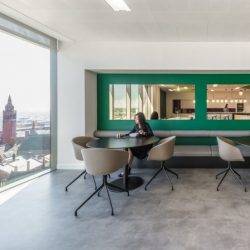To provide the best experiences, we use technologies like cookies to store and/or access device information. Consenting to these technologies will allow us to process data such as browsing behaviour or unique IDs on this site. Not consenting or withdrawing consent, may adversely affect certain features and functions.
The technical storage or access is strictly necessary for the legitimate purpose of enabling the use of a specific service explicitly requested by the subscriber or user, or for the sole purpose of carrying out the transmission of a communication over an electronic communications network.
The technical storage or access is necessary for the legitimate purpose of storing preferences that are not requested by the subscriber or user.
The technical storage or access that is used exclusively for statistical purposes.
The technical storage or access that is used exclusively for anonymous statistical purposes. Without a subpoena, voluntary compliance on the part of your Internet Service Provider, or additional records from a third party, information stored or retrieved for this purpose alone cannot usually be used to identify you.
The technical storage or access is required to create user profiles to send advertising, or to track the user on a website or across several websites for similar marketing purposes.
 Over half of home workers say they appreciate the benefits that home working offers but nearly a quarter complain of loneliness too, a new survey from BHSF claims. When asked how working from home makes them feel, the top three responses were: free (50 percent), in control (47 percent) and calm (46 percent). However, a significant number of those surveyed chose more negative words to describe their feelings. Just over a quarter (26 percent) said that working from home made them feel remote, 24 percent felt isolated and 21 percent lonely. (more…)
Over half of home workers say they appreciate the benefits that home working offers but nearly a quarter complain of loneliness too, a new survey from BHSF claims. When asked how working from home makes them feel, the top three responses were: free (50 percent), in control (47 percent) and calm (46 percent). However, a significant number of those surveyed chose more negative words to describe their feelings. Just over a quarter (26 percent) said that working from home made them feel remote, 24 percent felt isolated and 21 percent lonely. (more…)









 Thanks to technology and mobility, our work has come home with us. So it’s only fair that home should come to work, right? It would seem logical that if people sit in front of a TV on the sofa at home while they work remotely, employees would be thrilled to have a similar set up within their office. However, in the workplaces where we’ve seen companies install couches and big screen TVs, those work spaces are almost never used by employees. Those companies missed the bigger picture. Home is as much an emotional experience as a physical one.
Thanks to technology and mobility, our work has come home with us. So it’s only fair that home should come to work, right? It would seem logical that if people sit in front of a TV on the sofa at home while they work remotely, employees would be thrilled to have a similar set up within their office. However, in the workplaces where we’ve seen companies install couches and big screen TVs, those work spaces are almost never used by employees. Those companies missed the bigger picture. Home is as much an emotional experience as a physical one.
 The rise of data and digitisation has led to the demise of the traditional working day for many CEOs, with a third now checking business analytics first thing in the morning and last thing before they go to bed. This peaks at 54 percent among 25-34 year olds but drops to just 5 percent for leaders over 45, who are much more fixed to their desk. According to the research by Domo (registration required), 80 percent of these leaders prefer to wait until they are in the office to check in. Three quarters (71 percent) of CEOs across the UK and Ireland believe their business could be at risk from current blind spots in data access and skills, however, there is another demographic split. 84 percent of CEOs age 25-34 said it could be a risk, compared to just half of over 55s.
The rise of data and digitisation has led to the demise of the traditional working day for many CEOs, with a third now checking business analytics first thing in the morning and last thing before they go to bed. This peaks at 54 percent among 25-34 year olds but drops to just 5 percent for leaders over 45, who are much more fixed to their desk. According to the research by Domo (registration required), 80 percent of these leaders prefer to wait until they are in the office to check in. Three quarters (71 percent) of CEOs across the UK and Ireland believe their business could be at risk from current blind spots in data access and skills, however, there is another demographic split. 84 percent of CEOs age 25-34 said it could be a risk, compared to just half of over 55s.










 Today is World Mental Health Day and new research from Bupa has found that concerns over mental health is not confined to adults, as a third of employees say they worry about their children’s mental health while at work. The research, conducted among working parents of 4-18 year olds reveals that children’s mental health is among parents’ greatest concerns, on par with physical health and academic performance. The only concern that ranks higher is future financial prospects.
Today is World Mental Health Day and new research from Bupa has found that concerns over mental health is not confined to adults, as a third of employees say they worry about their children’s mental health while at work. The research, conducted among working parents of 4-18 year olds reveals that children’s mental health is among parents’ greatest concerns, on par with physical health and academic performance. The only concern that ranks higher is future financial prospects. 
 The majority of employees (77 percent) agree that people should take proactive steps to manage their mental health a new survey has revealed. Of those surveyed, the vast majority felt that there is increased awareness about mental health (87 percent) and that people are more willing to talk openly about mental health issues than they were a few years ago (82 percent). The impact of high-profile people speaking out about their own mental health challenges was believed to be the biggest influencing factor, cited by more than half (53 percent) of respondents.
The majority of employees (77 percent) agree that people should take proactive steps to manage their mental health a new survey has revealed. Of those surveyed, the vast majority felt that there is increased awareness about mental health (87 percent) and that people are more willing to talk openly about mental health issues than they were a few years ago (82 percent). The impact of high-profile people speaking out about their own mental health challenges was believed to be the biggest influencing factor, cited by more than half (53 percent) of respondents. 








November 8, 2018
Your relationship with your boss may be playing a role in your stress levels
by Martin Turner and Matthew Slater • Comment, Wellbeing
(more…)